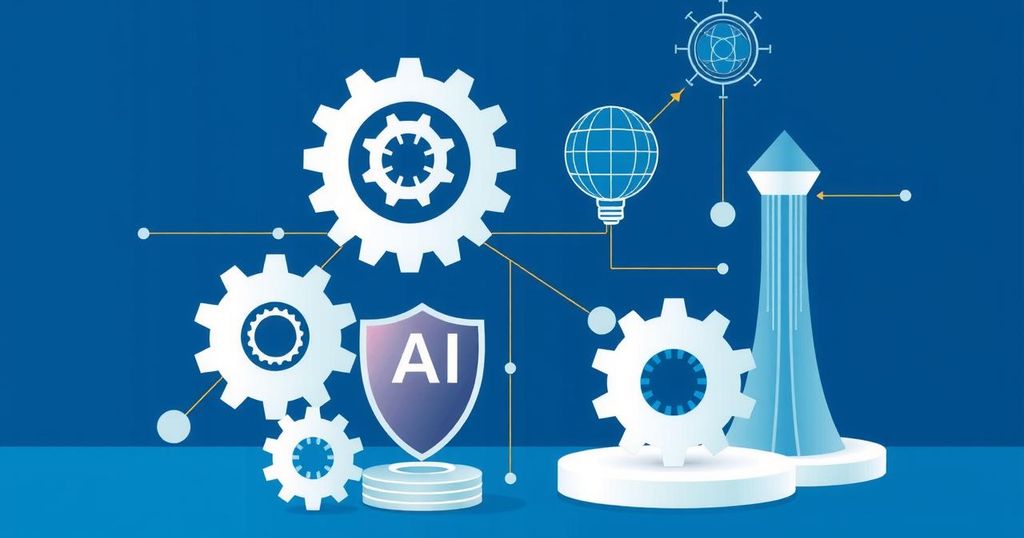Japan’s Regulatory Roadmap for Artificial Intelligence Unveiled
Japan’s government is actively working on AI regulations, as outlined in a recent interim report and a proposed bill. These efforts aim to integrate both hard and soft laws to govern AI’s development, utilization, and its implications for businesses and society. Key focuses include strengthening government roles, ensuring cooperation among operators, and maintaining transparency in cases of rights violations.
On February 4, 2025, Japan’s government unveiled an interim report during a joint meeting of the AI System Study Group and the AI Strategy Council, marking a significant moment for artificial intelligence regulation. Just a few weeks later, on February 28, they presented the first cross-cutting bill to the Diet about the Promotion of Research, Development, and Use of AI Technologies. This bill signifies a shift from voluntary guidelines to more rigorous regulatory measures, blending hard law with soft guidance.
The interim report emphasizes that current AI rules are derived from guidelines crafted by various ministries and industry bodies, but future regulations will incorporate enforceable laws. This pending legislation is still being debated and has not been finalized. Understanding both the interim report and the bill is vital to grasp the future landscape of AI regulation in Japan.
To navigate these regulations, it is essential to define AI. The bill defines “artificial intelligence-related technologies” as talents emulating human cognition, reasoning, and judgment through artificial means. The AI Guidelines for Business, established by the Ministry of Internal Affairs and Communications, acknowledge that while there’s no universal definition, AI encompasses various systems and software that enable machine learning and generation of content, including text, images, and programs.
The interim report outlines the strengthening of government roles in enhancing AI integration from research through to social applications. It highlights the need for comprehensive policy strategies engaging multiple ministries to effectively govern AI development and utilization. The bill elaborates on this role, underscoring the government’s necessary position as a facilitator.
Ensuring proper practices in the AI lifecycle is another critical point. The interim report advocates for duly structured guidelines reflective of global norms, such as the Hiroshima AI Process, which the government aims to implement through surveys and support initiatives for businesses. The forthcoming bill insists that businesses must cooperate with government policies in technological advancement, reinforcing the importance of collaborative governance.
Moreover, in incidents of serious violations of rights concerning AI use, the interim report calls for investigations and necessary disclosures from the government. This involves sharing information with the public regarding such infringements. The AI bill supports this directive by granting the government the authority to instruct, advise, and disclose information relevant to these cases.
To maintain the delicate balance between promoting innovation and managing risks, the interim report suggests a combination of regulations and guidelines, emphasizing the autonomy of business operators. The legislation may possess limited or no penalty provisions, as the focus is on encouraging self-regulation.
In addressing foreign operators, the interim report stipulates that it is inappropriate to exclude them from regulations, given that many AI technologies in Japan originate internationally. While it is expected that such operators will be held accountable, the current bill does not clearly define how this will be enforced.
In conclusion, Japan’s evolving AI legislation promises to strengthen governmental leadership, endorse cooperative practices among businesses, and require transparency during investigations of rights infringements. It’s crucial for stakeholders in the AI ecosystem to remain vigilant about legislative developments, bearing in mind that existing industry-specific laws will remain applicable even after new regulations are enacted.
The upcoming AI legislation in Japan will focus on enhancing government roles, ensuring business adherence to guidelines, and promoting transparency in handling rights violations. Stakeholders must stay informed about these emerging regulations while continuing to be governed by existing industry guidelines. This period marks a transformation in Japan’s approach to AI, as it seeks a harmonious balance between innovation and responsible use.
Original Source: law.asia




Post Comment